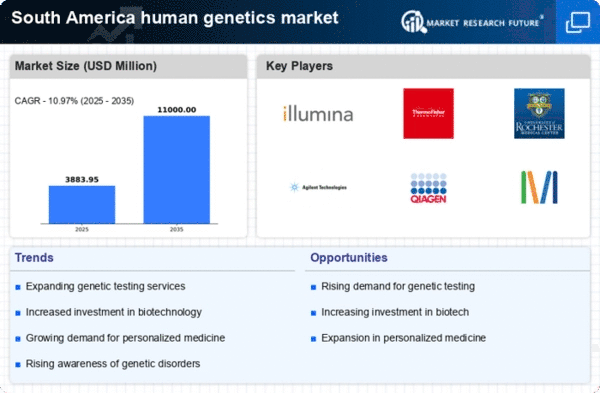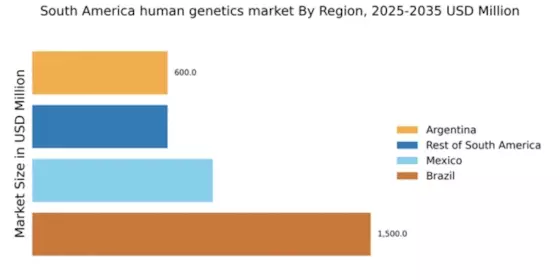Regulatory Support for Genetic Testing
Regulatory frameworks are evolving to support the growth of the human genetics market in South America. Governments are increasingly recognizing the need for clear guidelines and regulations surrounding genetic testing and its applications. This regulatory support is essential for ensuring the safety and efficacy of genetic tests, which in turn fosters public trust and encourages adoption. As regulatory bodies establish standards for genetic testing, the market is likely to see an influx of new products that comply with these guidelines. This development not only enhances the credibility of genetic testing services but also stimulates competition within the human genetics market, ultimately benefiting consumers through improved access to reliable genetic information.
Rising Prevalence of Genetic Disorders
The increasing incidence of genetic disorders in South America is a crucial driver for the human genetics market. Conditions such as cystic fibrosis, sickle cell anemia, and various hereditary cancers are becoming more prevalent, prompting a greater need for genetic testing and counseling services. According to recent estimates, approximately 1 in 300 individuals in South America may be affected by a genetic disorder, which translates to millions of potential patients. This rising prevalence not only highlights the necessity for advanced genetic diagnostics but also stimulates demand for innovative therapies and treatments. As healthcare providers and patients seek to understand genetic risks, the human genetics market is likely to experience substantial growth, with investments in research and development aimed at addressing these disorders.
Increased Investment in Genetic Research
Investment in genetic research is a significant driver for the human genetics market in South America. Governments and private entities are recognizing the importance of genetic research in addressing public health challenges. For instance, funding for genetic research initiatives has seen a marked increase, with several countries allocating millions of $ to support local research projects. This financial backing is crucial for fostering innovation and developing new genetic tests and therapies. As research institutions collaborate with biotech companies, the human genetics market is likely to benefit from a surge in novel products and services aimed at improving health outcomes. The focus on genetic research not only enhances scientific knowledge but also contributes to the overall growth of the healthcare sector.
Growing Awareness of Personalized Medicine
The shift towards personalized medicine is becoming a pivotal driver for the human genetics market in South America. Patients and healthcare professionals are increasingly recognizing the value of tailored treatments based on genetic profiles. This trend is supported by a growing body of evidence suggesting that personalized approaches can lead to better therapeutic outcomes. In South America, the market for personalized medicine is projected to grow at a CAGR of approximately 15% over the next five years. As healthcare systems adapt to this paradigm shift, the demand for genetic testing and analysis is expected to rise, further propelling the human genetics market. This evolution not only enhances patient care but also encourages investment in genetic research and development.
Technological Innovations in Genetic Research
Technological advancements are significantly shaping the human genetics market in South America. Innovations such as CRISPR gene editing, next-generation sequencing (NGS), and bioinformatics tools are enhancing the capabilities of genetic research and diagnostics. For instance, the cost of whole-genome sequencing has decreased by over 90% in the past decade, making it more accessible to researchers and healthcare providers. This democratization of technology allows for more extensive genetic studies and personalized medicine approaches. As a result, the human genetics market is witnessing an influx of new products and services that cater to both clinical and research applications, potentially leading to improved patient outcomes and more effective treatments.


















